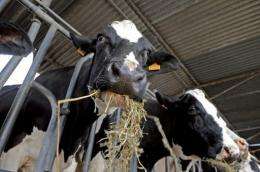Photo illustration. Feeding dairy cows the stems, seeds and skins from wine grapes boosts milk production and dramatically cuts the animal's methane emissions, Australian researched published Thursday shows.
Feeding dairy cows the stems, seeds and skins from wine grapes boosts milk production and dramatically cuts the animal's methane emissions, Australian researched published Thursday shows.
Scientists found that supplementing the cows' feed with grape marc -- the leftover material from wine-making -- reduced cow emissions by 20 percent and increased milk production by five percent.
It also led to more healthy fatty acids in their milk, the research by Victoria's Department of Primary Industries found.
Scientist Peter Moate said researchers were stunned by the results, with the cut to methane emissions thought to represent the largest reduction of its kind ever attained through the use of a feed supplement.
"We've managed to utilise what is currently a waste product for the wine industry and turn it into a very valuable feed source," Moate said.
The scientists supplemented the diet of dairy cows with five kilograms of dried grape marc over 37 days and compared the results with other animals fed conventional fodder.
Moate said the research showed that fatty acids in the grape marc milk were six times higher than with standard autumn feed.
"These particular fatty acids are extremely potent in their ability to benefit heart health and are also known to help fight cancer, diabetes and arthritis," he said.
Moate added there were also indications that cows fed grape marc produced milk with higher levels of healthy anti-oxidants and further tests were being conducted to verify this.
The research is part of a wider programme looking at the use of feed supplements to reduce methane emissions, including brewers' grains and cold-pressed canola meal.
The dairy industry in Victoria state provides than 85 percent of Australia’s dairy exports, producing 5.9 billion litres of raw milk each year from a herd of around one million cows.
(c) 2011 AFP



















